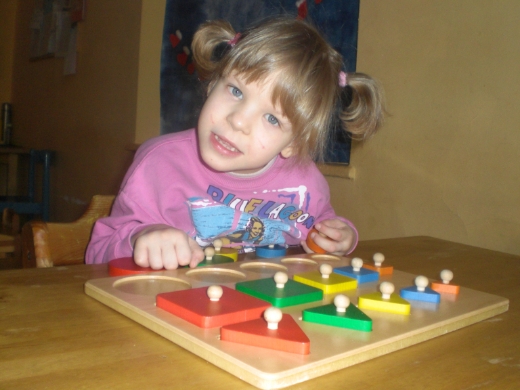Interacting With the Individuals With Special Needs

Ten Things A Person With Autism Wish You Knew
Interacting With the Individuals With Special Needs
This article is to provide general information to the general population regarding how to interact with the disabled. Guidelines will be given and explanations and rationales behind those guidelines will also be provided in order for the reader to be able to be confident and successfully interact with the special needs population.
First it is really important when you look at another human being especially a special needs person that you not try to assign a value to them. This can be offensive. Each individual has a purpose on this planet and their existence can’t be judged by another human being. So when you see a person, especially a person with special needs, it is important to see them as a human being first. That is how you would wish to be measured.
Second, given the isolation of the special needs population it has factored into their ability to overcome their disability. In essence they still live exceptionally segregated lives. This limits their ability to socially interact and to be as sophisticated as their typically developing peers. So your interaction with a person with special needs is critical to improving their socialization skills.
Third, because children with special needs are at such high risk for physical and sexual abuse it is critical that everyone in society focus their eyes on these children so they are not exploited. Your mere interaction can prevent a child from being abused. It is a sad reality of the special needs population that society has limited interaction with this population as they could be their guardians.
Fourth, one day we will all grow old and become the special needs population. I know this is a horrific thought for most of you but it is in fact true. How you treat others will be how you will be treated. But if you know the network of providers to the special needs population when you become a person with special needs your treatment will be more humane.
Fifth if you are a subculture or a minority it only behooves your cause to assist another minority. It is the infighting within the minorities which divides and limits their success.
How to Intertact?
First Contact
It is really important that you smile and if a special needs person approaches you be friendly. But do not touch the child. The parent will become very afraid as they are well aware their children are prime targets for abuse. Speak in soft tones and try to find something nice to say. Every single human being has something quite extraordinary about them. You just have to be able to see the goodness in people. And that shouldn’t be hard especially with a child.
If the child touches you nicely but in an inappropriate place by accident just simply move away. Sometimes children with special needs have bad eye sight and they mean nothing by it. Trust me the special needs population isn’t subtle. You will know if inappropriate advances are being made to you. Although it is highly unlike in anyone under the age of eighteen that isn’t institutionalized.
Within a few seconds the parent should be close behind. Introduce yourself to the parent and find something nice to say about the child. “Your child is very social.”, is a perfect line. Women can usually touch special needs children without startling the Mother but it is a good general practice not to touch a child unless you know the parent well. But there are exceptions to every rule. So I will provide you with an example. The grocery store is a fertile ground for socialization for my son. We were in line trying to check out and an elderly woman was flirting with my son. She kept calling him retard. I tell my son we live beyond labels. He is well aware people will label him but by no means is that to ever define our existence. It is sage advice for anyone reading this to take as well. I kept my mouth shut she was 76 and it didn’t seem to bother my son. Her husband was standing behind her with the grocery cart. She kept saying, “What a cute little retarded child.”. I was trying to right the check. She kept touching my son and running her fingers through his hair. But she was elderly and appreciated the attention my young handsome son was giving her. And as I finish writing the check my son grabs the woman and plants a kiss right on her mouth. I almost died. The elderly woman was rather shocked but she had been sending signals to my son without understanding his cognitive ability. The husband realized his wife had been playing with fire and he was a good sport. He looked at my son and said, “Hey, buddy lay off she is married.”. and my son moved away from the woman.
The point is never assume an person’s cognitive ability even when they have special needs. Special needs doesn’t always mean demised cognitive ability. Not all special needs are Down’s Syndrome although I realize that is what is getting all of the media attention and diverting the issue of Autism as a National crisis.
So make certain the signals you send are that of appropriate adult/ child relations.
Eye Contact
Sometimes you get eye contact and sometimes you do not. But if a child has made eye contact and has broke eye contact and returned safely to his parent let the child alone. He can’t handle anymore socialization. If the child begins screaming or yelling just walk away. He also can’t handle more socialization.
Tone
Your voice tone should be calm, soft and consistent. And say something nice like, “Are you helping your Mother today?”.
In The Club Mentality
Everyone likes to feel as if they are included. So if you treat a person with special needs like they are in the club of society then you really can’t go wrong.
These few and simple steps could create a generation of special needs who no longer require institutionalized because they have the social supports in society but they can’t do it without society. It costs far more to institutionalize than to have the special needs population live amongst us and it prepares us to care for our elderly which is our fastest growing population in this country.
Ask yourself this? How would you want to be treated? And then treat people with special needs that way.
Assistance
You can help a special needs child and family in so many ways. But by providing acceptance of this population is the simplest place to start. There are many organizations to assist the special needs population. As a parent of a child with special needs I am always asked to contribute to those charities but my son never quite seem to be the beneficiary. I live in a place that is flush with charity monies but none have touched us thus far beyond a Thanksgiving meal which we are entirely grateful for. But I have a feeling that the more aware people are of the special needs population the better the chances are that their donations actually start reaching that specific population. And it all begins with you. Can you see a person for their attributes and accept them as they are? I have every faith you can.
When a Special needs child acts up do not judge. Those parents are practically the special forces of parenting. The have been taught behavior interventions. They know how to do things you may not understand. Don’t be judgmental. Trust me the Mom of the child with ADHD that has had to chase them all over the park and yell their name a thousand times realizes how hard their job is so don’t call anymore attention to them then is necessary. If anything ask if you can help.
Famous Leaders Who Have or Are Suspected of Having Autism
Things Not To Ask Or Say.
1) Doesn’t the government help you? The answer is a resounding “NO!”. And it will only serve to aggravate the parent who is getting nothing to have to answer that question.
2) “What is wrong with your child?”
3) Don’t speak about the special needs child in the third person when they are standing there. It is insulting.
4) Don’t recommend medical treatment. No matter how good your intentions. I know parents who know biochemistry better then biochemistry majors. So please don’t offer advice.
5) Don’t assume you know a child’s cognitive ability.
6) Don’t tell the parent about your experiences with the special needs population or charity. Chances are the parent hasn’t seen a dime of assistance and every experience with a special needs individual is special and individual.
7) Don’t ask about a diagnosis or a label. And don’t assume then
either.
8) Don’t ask about the child’s schooling it is a very segregated
experience, if school is provided at all. Sometimes schools refuse to provide education to the special needs population.
9) Don’t ask about the Father. Divorce rates are around 85% with
special needs populations. More then likely the Mother is on her own and it isn’t a pleasant conversation.
10) Don’t pity the special needs population They don’t want it nor
do they need it; provide acceptance.
11) Don’t stare.
12) Don’t recite that very ignorant story written about life as a special needs parent in which the author uses a metaphor that parenting a special needs child is like not getting to go to Italy but Spain. It is more like going into the field of biochemistry. law and several other very specialized fields of study. Sincerely it is beyond your comprehension unless you live it each and everyday. The experience can’t be summarized in a metaphor.
In Conclusion
The special needs population is all around you and you can choose to embrace them with acceptance and respect or ignore them. The choice is yours. But what a wonderful world it would be if we could not longer stare at special needs people with pity but accept them as part of our communities. Because these special needs children and families have been forced to fend on their own for so very long they have developed their own set of cultural norms. Norms that will take you a long time to learn. But there are simple things you could do like organize a community awareness program through your church. You can support the families with special needs children in your local community. It is not hard you just have to open your heart and your mind. The rewards you will receive are also beyond your comprehension.
Related Links
- What Is Wrong With Him?
An article about how the USA government ostracizes disabled children especially those with rare disorders and Autism in America. - Biochemical Explanation of Children with Autism and ADHD
Detailed article about the possible etiolgy of Autism and ADHD specifically the biochemical causes and elludes to possible treatments. - Success For Children with Attention Deficit Hyperactivity Disorder
For the purposes of this article I have provided guidelines for parents because parents have the most vested interest in reading and following through. I believe parents of children with ADHD need supports through their communities and schools, assis - Autism Global Phenomena
Analyss of Autism as a Global Phenomena. - What It Is Like To Be Told Your Child Is Terminal
An article about the USA abandoning the medically fragile autistic children of this country to pursue treasure and oil in the Middle East.





